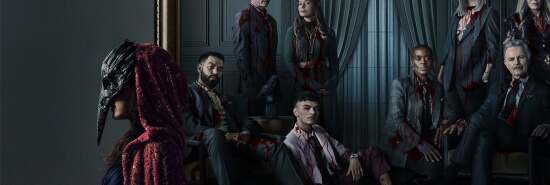
The fall of the House of Mumbo Jumbo
Spencer Klavan
Video Embed
Mike Flanagan is awfully talented, but he’s just not making any sense. I want to like everything he makes — including his latest Halloween horror show on Netflix, The Fall of the House of Usher. It’s based on Edgar Allan Poe’s unforgettable short story of the same name, with plot elements from Poe’s other fiction and poetry.
But Flanagan’s own philosophy is a contradictory jumble of ditzy platitudes, which causes his plots to fall apart.
WHY TRUMP’S FULTON COUNTY CO-DEFENDANTS KEEP TAKING PLEA AGREEMENTS
The best and worst thing about Flanagan is his exceptional taste in the source material, from Shirley Jackson’s The Haunting of Hill House to Henry James’s The Turn of the Screw. To ask whether Flanagan stays faithful to these inspirations is to ask the wrong question: He’s not trying to resurrect the classics so much as to riff on them in a manner vaguely inspired by their general mood.
Old masters such as Jackson and Poe hold up in their own right; they would benefit from being freshly adapted in earnest. It’s a little bizarre that Flanagan, who obviously admires their craft, would pick up their stories only to mine them for spooky vibes like literary Pinterest boards. Be that as it may, his work is effectively original and deserves to be judged in its own right — for better or for worse.
Except it’s increasingly for worse. In this latest effort, toxic “Chad” drug magnate Roderick Usher (Bruce Greenwood) has made a literal deal with death. His empire is built on a fictional version of the ferociously addictive painkiller oxycodone; he has six adult heirs. Some of them are legitimate, and some are illegitimate. But (spoiler alert) most of them are gay, and they all die.
That was the deal: Episode by episode, the assorted nepo babies are picked off in macabre fashion by a mysteriously ageless woman (Carla Gugino). This spectral wine aunt once offered Roderick and his sister Madeline (Mary McDonnell) immunity from the law as they murdered and cheated their way to hyper-affluence. In exchange, she gets to extinguish the Usher bloodline.
But I challenge you to figure out a plausible reason why the slinky murder-lady wants the Ushers and their countless victims to die. It’s not to pass judgment on their souls: she’s very clear that there’s “no such thing.” There’s no personal afterlife in Flanagan’s stories: We just slosh our way back into the cosmic soup from which we came. This is the kind of pseudo-Buddhist claptrap that ruined his best creation, Midnight Mass, in which a tiny island church makes a desperate stand against vampires until Flanagan’s wife, Kate Siegel, dreamily explains that individual consciousness is an illusion.
In which case, what the hell is the point? If souls are just fairy tales, what on earth are all these vampires and death-ladies doing hanging about? They seem real enough. But since humanity is just a passing dream, there is no conceivable reason why they should have any interest in us. They can’t save or damn our souls, so all that’s left for them to do is lecture us nonsensically about politics.
“Starvation, poverty, disease: You could solve all that, just with money,” the spirit of death informs us. At some point in her eternity of walking the earth she might have asked an economist whether that is indeed how money works (it is not). Instead, she has been too busy seducing evildoers — i.e., straight white men, including (of course) former President Donald Trump.
Sympathetic characters, i.e., the polysexual or mixed-race ones, do not get spared. But some of them do get patted on the back — especially Roderick’s granddaughter, Lenore, who saves her mother from her sadistic white male father. Death-lady warmly congratulates her on this act of heroism; then, she promptly kills her. The effects of Lenore’s kindness will reverberate for generations. A fat lot of good this does her, though, since she is now cosmic soup.
CLICK HERE TO READ MORE FROM THE WASHINGTON EXAMINER
If there are demons, then surely there is a soul. But Flanagan obviously considers Christian orthodoxy so outmoded that he is ready to embrace spiritual horror while rejecting the spiritual comfort it implies. He is like a man who wants to pay for a car but refuses to drive it home. This self-defeating attitude, symptomatic of our doggedly shallow age, turns potentially smart people into mumbling idiots. It also ruins, among other things, what could otherwise be great TV.
Spencer Klavan is an associate editor of the Claremont Review of Books, host of the Young Heretics podcast, and author of How to Save the West.
